Finance
FRAUD: Court Sentences Invictus Obi To Ten Years


A US court has sentenced Obinwanne Okeke also known as Invictus Obi to 10 years in prison.
Okeke was sentenced for his involvement in a computer-based intrusion fraud scheme that caused approximately $11 million in known losses to his victims.
According to court documents the 33-year-old operated a group of companies known as the Invictus Group based in Nigeria and elsewhere.
From approximately 2015 to 2019, Okeke and others engaged in a conspiracy to conduct various computer-based frauds.
The conspirators obtained and compiled the credentials of hundreds of victims, including victims in the Eastern District of Virginia.
The Acting U.S. Attorney for the Eastern District of Virginia, Raj Parekh while sentencing him on Tuesday said, “Through subterfuge and impersonation, Obinwanne Okeke engaged in a multi-year global business email and computer hacking scheme that caused a staggering $11 million in losses to his victims.”
Parekh added that “Today’s sentence further demonstrates EDVA’s and FBI’s worldwide reach in vigorously pursuing justice on behalf of American victims and others and holding international cybercriminals accountable, no matter where they commit their crimes.”
Other details provided by the U.S. Attorney’s Office for the Eastern District of Virginia revealed that Okeke and other conspirators engaged in an email compromise scheme targeting a company – Unatrac Holding Limited, the export sales office for Caterpillar heavy industrial and farm equipment.
“In April 2018, a Unatrac executive fell prey to a phishing email that allowed conspirators to capture login credentials.
“The conspirators sent fraudulent wire transfer requests and attached fake invoices. Okeke participated in the effort to victimize Unatrac through fraudulent wire transfers totaling nearly $11 million, which was transferred overseas.
“Additionally, Okeke engaged in other forms of cyberfraud, including sending phishing emails to capture email credentials, creating fraudulent web pages, and causing other losses to numerous victims.”
He was arrested by the Federal Bureau of Investigation (FBI) at Dulles International Airport while leaving the US over $11 million internet fraud in 2019.
However, after months of denying his involvement in the crime before a federal judge in the U.S. and argument of jurisdiction, he pleaded guilty to the allegation of conspiracy to commit wire fraud and agreed to cooperate with American authorities last year June.
“The FBI will not allow cyber criminals free reign in the digital world to prey on U.S. companies,” said Brian Dugan, Special Agent in Charge of the FBI’s Norfolk Field Office.
“This sentencing demonstrates the FBI’s commitment to working with our partners at the Department of Justice and our foreign counterparts to locate cyber criminals across the globe and bring them to the United States to be held accountable.”
Finance
Banks To Now Charge 0.5% Cybersecurity Levy As Directed By CBN; Netizens React
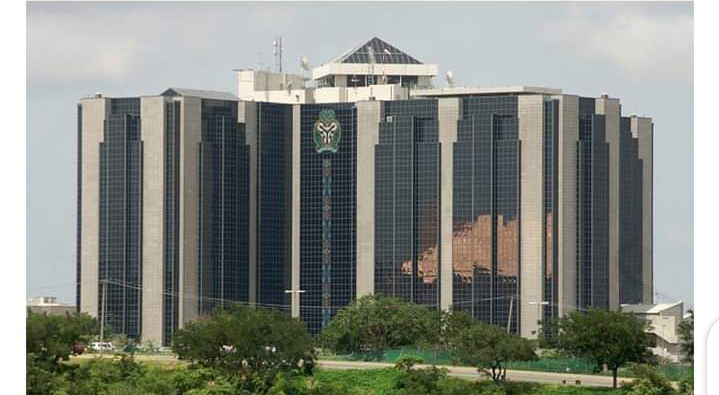

The Central Bank of Nigeria (CBN) has directed deposit money banks in the country to start charging 0.5% cybersecurity levy on some transactions done by their customers.
The apex bank gave the directive in a circular dated May 6, 2024 and sent to all commercial, merchant, non-interest and payment service banks as well as mobile money operators and payment service providers.
“Following the enactment of the Cybercrime (Prohibition, Prevention, etc) (amendment) Act 2024 and pursuant to the provision of Section 44 (2) (a) of the Act, ‘a levy of 0.5% (0.005) equivalent to a half percent of all electronic transactions value by the business specified in the Second Schedule of the Act’, is to be remitted to the National Cybersecurity Fund (NCF), which shall be administered by the Office of the National Security Adviser (ONSA),” the circular partly read.
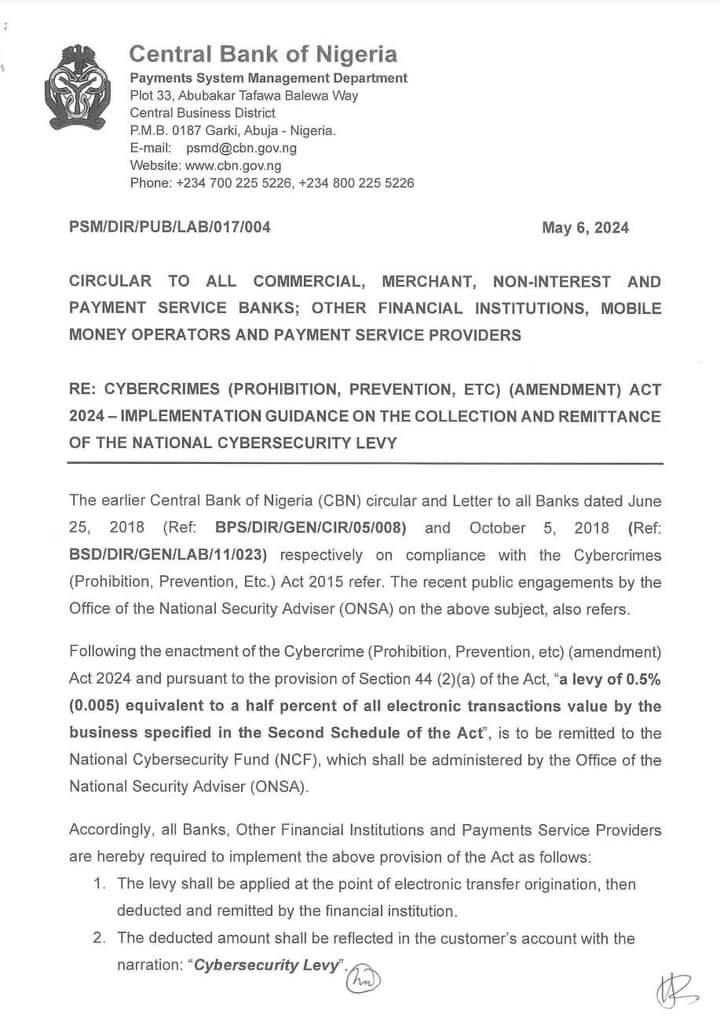

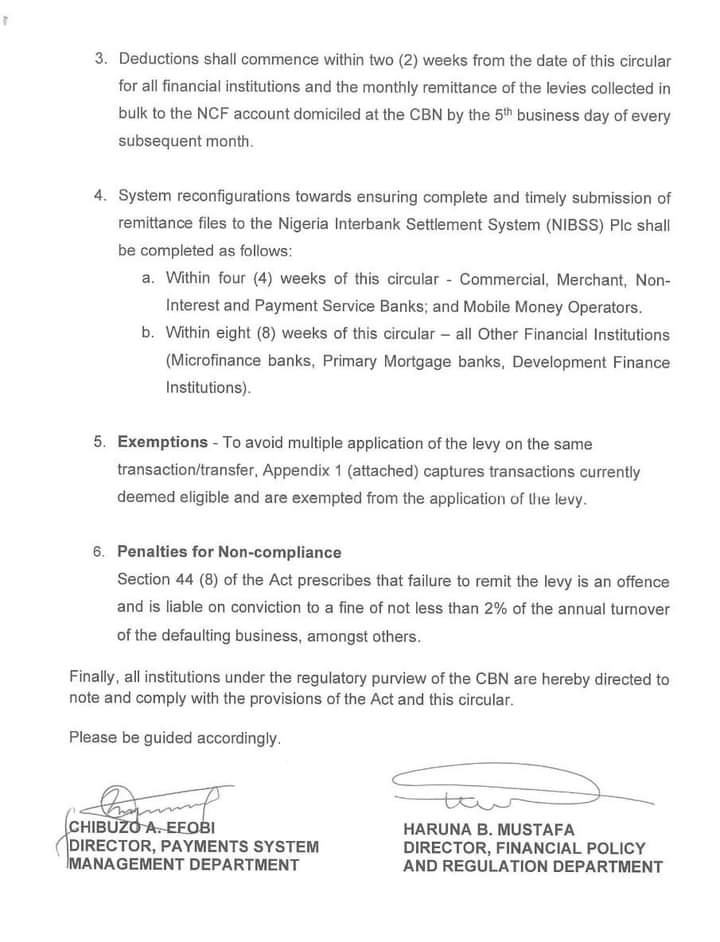

The apex bank said that the implementation of the levy would start two weeks from the date of the circular.
“The levy shall be applied at the point of electronic transfer origination, then deducted and remitted by the financial institution. The deducted amount shall be reflected in the customer’s account with the narration, ‘Cybersecurity Levy’. Deductions shall commence within two weeks from the date of this circular for all financial institutions and the monthly remittance of the levies collected in bulk to the NCF account domiciled at the CBN by the fifth business day of every subsequent month,” the circular said
The apex bank added that this new levy will not be applied on transactions such as loan disbursements and repayments, salary payments, intra-account transfers within the same bank or between different banks for the same customer, intra-bank transfers between customers of the same bank.
Also exempted from the levy were inter-branch transfers within a bank, cheque clearing and settlements, Letters of Credits, Banks’ recapitalisation-related funding only bulk funds movement from collection accounts, savings and deposits including transactions involving long-term investments, among others.
This current implementation however is not sitting well with some netizens as they reacted to the new development.
Here were some of their reactions from X.
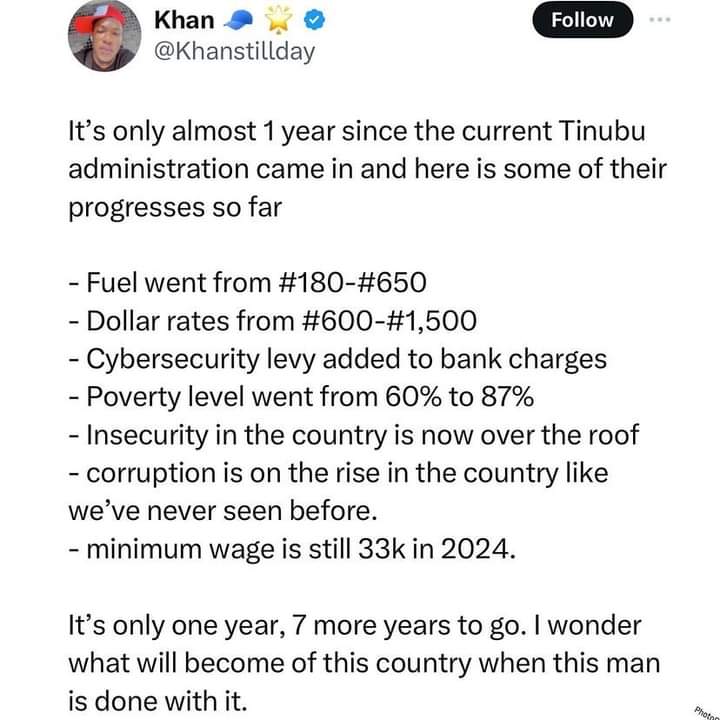





Finance
EFCC Chairman Tasks Nigerian Youths Against Crimes And Fraudulent Acts


The Chairman of Economic Finance Crime Commission (EFCC), Ola Olukoyede, has stressed the need for Nigerian Youth to see themselves as agents of positive change that have a lot to contribute to the socioeconomic development of the Nation.
Speaking at the 2nd edition of a Leadership Trainings Programme in Abuja, Olukoyede, who was represented by the Head Enlightenment and Re-orientation unit, (EFCC), Aisha Mohammed, said the commission’s dream is to see the youth contribute meaningfully to the society, emphasizing on the need to work together in bringing positive change to society.
The Economic and Financial Crimes Commission Boss declared the readiness of his agency to work with all Stakeholders, including the youth towards changing the narrative and reposition the country to greater exploit.
Also speaking, the representative of the Executive Secretary of Tertiary Education Trust Fund (TETFUND), Sonny Echono, appealed to the youths is to eschew social vices that could deter their full potential in life.
Other speakers at the event, including the Chairperson, Zero Tolerance for Social Immoralities Initiative (ZEITI) Africa, Rasak Jeje called on all stakeholders to join hands in collective pursuit of empowering new generation of leaders to curb the rising tides of social Vice among Nigerian youths.
The Chairperson, Zero Tolerance for Social Immoralities Initiative (ZEITI) Africa, Rasak Jeje made the call while addressing journalists at the 2nd edition of it Leadership Trainings Programme in Abuja on Thursday.
He said the training was aimed to intimate students leaders with knowledge and insights that will help them drive positive change and become exemplary leaders in their respective spheres.
Finance
AISA Has Refunded The Fees Paid By Yahaya Bello To EFCC


The Economic and Financial Crimes Commission (EFCC) says the American International School Abuja (AISA) has refunded the fees paid by the immediate past governor of Kogi state, Yahaya Bello, for his children attending the school.
In response to a letter addressed to the Lagos zonal commander of the EFCC, the school said $845,852 was paid in tuition “since the 7th of September 2021 to date”.
AISA said the sum to be refunded is $760,910 because it had deducted educational services already rendered.
“Please forward to us an official written request, with the authentic banking details of the EFCC, for the refund of the above-mentioned funds as previously indicated as part of your investigation into the alleged money laundering activities by the Bello family.
Since the 7th September 2021 to date, $845,852.84 (Eight Hundred and Forty-Five Thousand, Eight Hundred and Fifty Two US Dollars and eighty four cents) in tuition and other fees has been deposited into our Bank account.
We have calculated the net amount to be transferred and refunded to the State, after deducting the educational services rendered as $760,910.84. (Seven Hundred and Sixty Thousand, Nine Hundred and Ten US Dollars and Eighty Four cents).
No further additional fees are expected in respect of tuition as the students’ fees have now been settled until they graduate from ASIA.”
In a chat with The Cable, the spokesperson of the EFCC, Dele Oyewale, confirmed that the school has refunded the money.
‘’The money has been paid into public account,” Dele Oyewale was quoted as saying
-



 Politics3 days ago
Politics3 days agoLagos Water Corporation Starts Protest Against Sack Of Workers
-

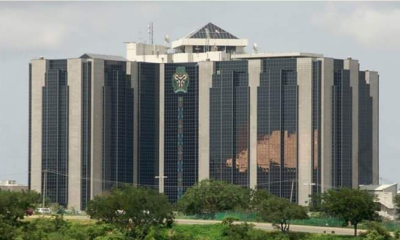

 Finance4 days ago
Finance4 days agoBanks To Now Charge 0.5% Cybersecurity Levy As Directed By CBN; Netizens React
-



 TechNews5 days ago
TechNews5 days agoSIM Boxing, And The Unboxing of a Crime Syndicate
-



 News3 days ago
News3 days agoEkiti Students Caught On Camera Bullying A Fellow Student, Have Been Expelled
-



 GRTech4 days ago
GRTech4 days agoSHELT SI Achieves Cisco Select Partner Certification
-



 Politics2 days ago
Politics2 days agoSenate Amends NDLEA Act, Approves Death Penalty For Dangerous Drugs Manufacturers And 15 Years Imprisonment For Users
-



 News2 days ago
News2 days agoRIMA Foundation Clocks 20 Years
-



 Spotlight2 days ago
Spotlight2 days agoYoung Man Named Young C, Delves Into The Challenge Of Being Buried Alive For 24 Hours







